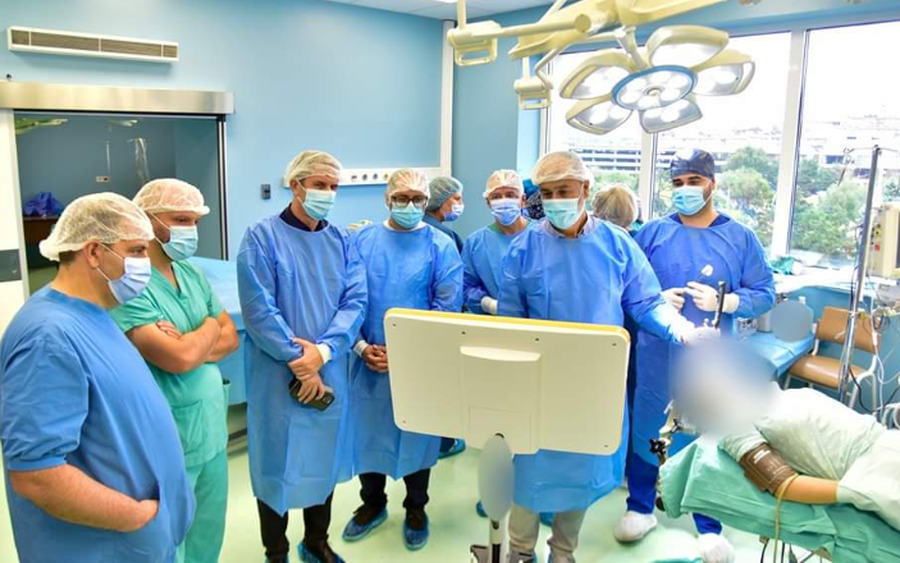
For years it has been talked about how doctors leave Kosovo, but no one says how to stop them.
In the Clinical and University Hospital Service of Kosovo (SHSKUK) they say only that " they leave of their own free will " - they do not indicate if they have any plan or strategy to entice them to stay.
With complaints about working conditions and salaries, the Chamber of Doctors of Kosovo show that, during 2024, 109 doctors have withdrawn their ethical past certificate, which serves them for employment abroad. In 2023, this figure was 167, while in the period 2018-2022, over 650.
"The departure of new health workers seriously damages the health sector in the country", say the Chamber of Doctors for Radio Free Europe.
And, this is obvious. Patients wait months, if not years, for some services, while many new devices are not even used because there are no professionals.
Why do doctors leave?
Dr. Shpendi - a name decided by the editors of Radio Evropa e Lire - is among the 18 doctors who left the University Clinical Center of Kosovo (QKUK) in 2024.
Specialized in gastroenterology, he says that he could not face the "bureaucracy" and "iron monopoly" in the clinic. According to him, KKUK has complete control over a part of the staff, which "does not welcome the new generations" , the reason for the competition.
"The head of the clinic, together with those of the wards, did not allow us to work. I have fulfilled all the obligations, all those trainings inside and outside the country and they did not allow me to show that knowledge", says Dr. Bird.
Doctor Arbër Muriqi left Kosovo two years ago, but for another reason: salary. In Kosovo, the salary of a specialist doctor is currently around 1,200 euros. The average salary in the country is around 570 euros.
Muriqi says he works in a hospital in Thuringia, Germany, where the starting salary is 5,000 euros.
"I came here... I work, I get a decent salary, we live a good life and help families," says anesthesiologist Muriqi for Radio Free Europe, who is specializing in neurology. In the German hospital where he works, he says there are other nurses and doctors from Kosovo.
How can the flight of doctors be prevented?
SHSKUK, which oversees KKUK and Kosovo's seven regional hospitals, did not respond to Radio Free Europe's question whether it has or plans any strategy to prevent doctors from fleeing. Similarly, neither the KKUK.
Hana Xhemajli, global health policy research specialist, tells Radio Free Europe that Kosovo's institutions do not have a clear strategy for the health system and medical staff.
According to her, they should create such policies that make the staff feel valuable in Kosovo, having decent salary and working conditions.
Also, their professional development should be stimulated and opportunities for advancement should be offered. Radio Free Europe has often reported on poor conditions in hospitals, rusty equipment, or lack of basic things like sheets.
Also, lack of medicines is almost a common problem and forces patients to buy them themselves.
Xhemajli says that Kosovo, moreover, has an aging population and the improvement of conditions must be done urgently.
"Within 20 years, we're going to have a much older population, and we have no choice as to how to keep the staff here and how to enable these institutions that we already have to be more functional," she says.
Countries like Germany or others in the European Union manage to adapt doctors from Kosovo very quickly, due to the conditions they offer, according to her.
The National Audit Office in Kosovo has estimated in the 2023 report that over 10,000 people, for months or years, are on waiting lists for various medical procedures - from heart surgeries to eye surgeries.
For this situation, the Audit Office has blamed the critical lack of medical personnel, especially anesthesiologists. KKUK has an Anesthesiology Clinic with 48 anesthesiologists – far fewer than the 100 it would need, according to its leaders.
The director of SHSKUK, Elvir Azizi, told Radio Free Europe earlier that the absence will continue for some time.
In 2025, he said, more than 15 doctors are expected to complete their specialization in anesthesiology, but it is uncertain how many of them will work within the state health system, as many have financed their own education - which means that they are not obliged to work there.
Therefore, without a clear and sustainable approach to addressing these challenges, Kosovo seems to risk losing an entire generation of health professionals, further worsening the conditions in its health sector./ REL
(A2 Televizion)





